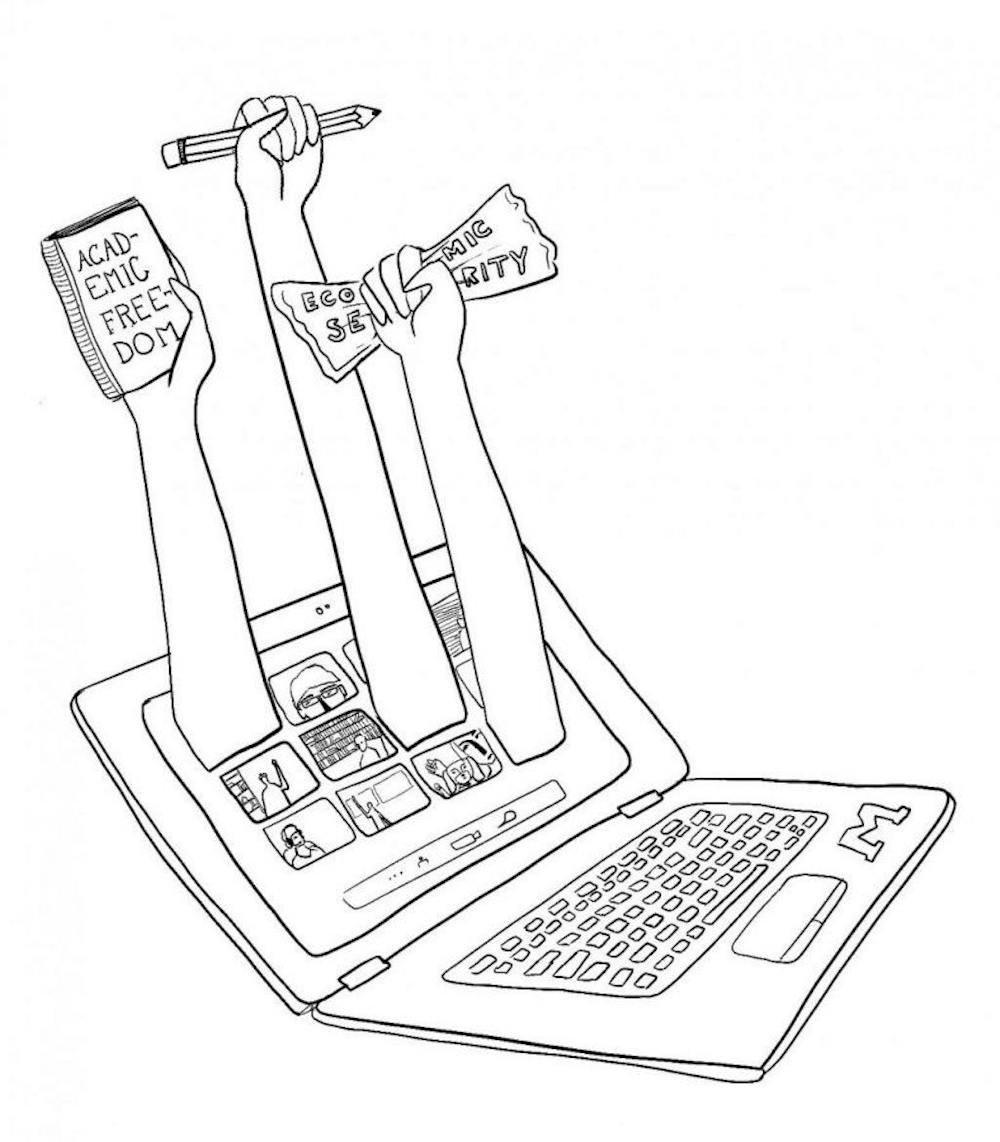A year ago, on May 14, 2020, Middlebury College faculty members reinstated the Middlebury chapter of the American Association of University Professors (AAUP), which by then had been dormant for a few years. Born out of budget austerity concerns, the group of faculty and staff are “dedicated to making sure employees have a seat at the table when the institution makes decisions that affect us all.”
Initially, the chapter’s membership consisted of a 60-person email list; now, President of the Middlebury AAUP Laurie Essig, professor of gender, sexuality and feminist studies, estimates that there are over 200 members of the group, consisting of faculty and staff from both the College and the Middlebury Institute of International Studies at Monterey (MIIS).
“We as a community need to take care of each other,” Essig said in an interview with the Campus.
Essig synthesized the impetus behind the AAUP’s current work. “When we have staff members, who are risking their lives to be frontline workers, and not earning enough money to eat, that’s a problem. When we have the inability to attract the best and the brightest professors, because our compensation is lower.”
A year of work
The Middlebury chapter of the AAUP’s reinstatement last year coincided with one of the most challenging years in recent memory. Many faculty and staff that The Campus interviewed for this story viewed baseline maintenance of employee pay and benefits at 2019 levels as a success in light of the pandemic burdening the college’s already weak financials.
“I think Middlebury handled the operations/logistics side of things during the pandemic very well. I am grateful for the clear communication around Covid protocols, the ability to work remotely, and the hard work of so many people to keep Middlebury up and running this academic year.” Associate Professor Tara Affolter, a member of the Middlebury AAUP, said in an email to The Campus. “Middlebury's commitment to keep folks employed through the pandemic is important and noteworthy.”
Essig believes the administration’s pandemic commitment to employees was due in part to the AAUP’s public lobbying, such as introducing Sense of the Faculty Motions, submitting op-eds in The Campus and the chapter’s working conditions subgroup thinking through employee’s return to campus.
Nevertheless, as a recent article in the Campus notes, not all staff members are happy about recent changes made in the name of ‘workplace safety’. One custodian interviewed in the article was blunt about the effect of seemingly top-down decision making has had, “We’re all very upset; morale around campus is really low for staff. We just don't feel like we're appreciated. I don't think any of us feel like we've got an opinion that is heard.”
Essig notes that the AAUP is currently working within their five subcommittees: Communications, Representation, A People’s Budget, Alliance Building and Alternative Survey.
Furthermore, the group is heavily involved in the Middlebury Open the Books campaign, which is advocating for the publication of the entirety of the College’s financial records.
“We believe radical fiscal transparency can happen and we think Middlebury could be a leader in it,” Essig said. She said that the campaign is motivated by a desire to know how many employees are earning less than a living wage, how many executives are earning high salaries, what discrepancies exist in pay among staff and other aspects of college finances that affect staff livelihood.
Another central pillar of the AAUP’s ongoing advocacy is the practice of faculty governance, allowing faculty a seat at the table in major financial decision making.
“Many of us serve on committees and do a lot of work behind the scenes to try to move the needle on making Middlebury a more equitable and just place,” Affolter said in an email to the Campus. “Yet, when big decisions (such as the recent financial decisions) are announced, faculty committees are not consulted and Sense of the Faculty motions are ignored.”
A bumpy road
Although the Middlebury AAUP was heavily involved in lobbying for different pandemic safety policies at the College — in June 2020, the Middlebury AAUP’s Working Conditions Subcommittee endorsed a remote fall semester — some wish that their advocacy was more inclusive of staff members as well.
One long-time facilities staff member who wished to remain anonymous believes that the 2020 revitalization of the AAUP could have been inspired by the public staff unionization campaign in the fall of 2019. “It was weird because the talk of the union came and it seemed like we had a lot of support from [faculty]. And I think that might have given them the idea, but they actually went together, and we completely fell apart.”
The staff member noted that at one large meeting in that fall unionization effort, a faculty member stood up and pleaded with administration to take better care of staff.
“Six months later the AAUP came. So you’re like, we put an idea in all these people’s heads,” they said.
“What some staff expressed to me, and it’s all anecdotal, was that last spring, the AAUP was loud, vocal, they helped preserve our checks, with the administration, of course. They were a large voice in dipping into the endowment. And they were making some noise about paying essential workers more,” Tim Parsons, the college’s landscape horticulturist and former President of Staff Council, said. “And then, after the semester was over, it was radio silence, and some staff I talked to felt like, well, where are they now for us? And we never heard from them again until October.”
However, one long-time administrative staff member who spoke on the condition of anonymity disagreed with Parsons’ description of AAUP-staff relations, “[the AAUP] is intended to be a faculty organization, but the Middlebury group has welcomed staff membership and has identified staff equity as a priority.”
In an email to the Campus, librarian Brenda Ellis noted that friction between faculty and staff often comes from the budgetary realities defined by the administration.
“There is actually no rift between faculty and staff. In fact faculty are very supportive of higher wages for staff,” she said. “But there’s a limited pie — a limited amount of money the College is willing to spend for employee compensation, so if the College increases faculty salaries to keep up or rise with their competition (as they’ve advocated for), it is going to mean that the staff raise pool won’t increases as much unless the College increases the amount for overall employee compensation.”
Essig acknowledged that the criticisms of the Middlebury AAUP regarding staff representation have merit.
“Here’s the problem: the AAUP was set up for professors of the American Association of University Professors. That’s what it was set up for,” she said. “I 100% agree that we don’t do a good job working for staff because that’s not what we are.”
The AAUP does include staff on every committee, including the Executive Committee. However, according to Essig, they are almost exclusively professional staff and are still far outnumbered by faculty.
Not all staff members even knew that they could join the AAUP.
“I didn’t realize [the AAUP] could also include staff… I thought it was like a different aspect of basically the same thing, a union for faculty, but I didn’t realize staff could also be involved,” said another longtime facilities staff member who wished to remain anonymous.
On May 3, the Middlebury AAUP website was updated with a new introductory section clarifying their mission in regards to including staff members, “We use the AAUP principles of faculty governance to make sure the voices of employees are heard and support our colleagues on staff with any movement toward collective representation they make.”
An approaching horizon
Faculty cannot currently unionize under the National Labor Relations Act due to the landmark 1980 U.S. Supreme Court case National Labor Relations Board vs. Yeshiva University, which ruled that faculty at private universities are managerial employees.
Essig believes that professors should organize anyways.
“I support professors’ attempts to unionize. I mean why not? We can be the first, I don’t see why Middlebury can’t lead,” Essig said, “We don’t have to just follow what everyone else does.”
Until recently, the college’s Senior Leadership Group had refused to even recognize the Middlebury AAUP’s existence. After repeated requests from the AAUP over the last year President Laurie Patton agreed to meet with members of the AAUP budget subcommittee on April 16 regarding their concerns over the Board of Trustees’ January meeting in which the Board capped endowment draw to 5% and raised student tuition and fees by 2.5%.
Such a hardline stance by the Board on the endowment has many concerned about the already prevalent issues of pay compression and undercompensation that affect many employees. At that same April 16 faculty meeting, a Sense of the Faculty motion drafted by the AAUP expressing discontent with the Board’s recent budgetary decisions passed with 87% of faculty in support.
“The administration’s attitude seems to be that if staff don’t like it, they can ‘vote with their feet.’ We have actually seen a lot more of that in recent years. Staff leave the college for less stressful jobs,” said the administrative staff member in an email to the Campus. “This used to be a workplace where people built lifelong careers and was known locally as the place to work. Not so much anymore, when wages are low and expectations are very high.”
There are currently 37 unfilled positions on the Middlebury College job board. The college is struggling to fill dining and facilities positions. In 2019, due to a shortage of custodians, the College hired independent contractors to clean some small houses on campus.
In response to advocacy for higher staff wages in late 2019, in early 2020 the College raised its minimum wage to $14.00 an hour. But this increase had broader repercussions of pay compression, as longtime staff members suddenly found themselves making little more than their newcomer peers. Even still, many employees are still earning below a living wage in Vermont.
An op-ed that Parsons wrote in March detailed how after working at Middlebury for 21 years — and while also working a second job — one staff member has to regularly go to the local food bank to feed their family.
“I know I’m not going to get rich doing what I’m doing,” said the second facilities employee, “It’d be nice to not have to worry about, ‘am I going to have enough money to put gas in my vehicle so I can get to work?’ That’d be nice.”
With the end of the pandemic in sight, many staff want to return to the conversation about low pay at the college. “It’s going to take the work of faculty, staff and administration to say, ‘This is our priority, this is what we want to spend money on,”’ said Parsons.
“They’re in the middle of trying to figure out whether or not we’re going to get a percentage raise July 1,” said the second facilities employee. “So that’s a lot of ‘hurry up and wait’ right now, and whether or not we’re going to have to storm the castle, you know?”
The first facilities employee provided a different characterization. “I think if we don’t get a raise in July, there’s going to be a lot of people who are really, really upset.”
Editor’s Note: The staff members interviewed in this piece were granted anonymity because of their fears of retribution from staff or management.
A previous version of this article included a quote that contained a noted grammatical mistake. The error has been corrected in the original source and in this article.

Jake Gaughan is an Editor at Large.
He previously served as an Opinion Editor and News Editor.




